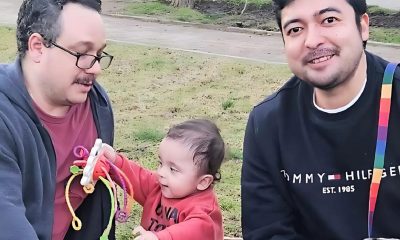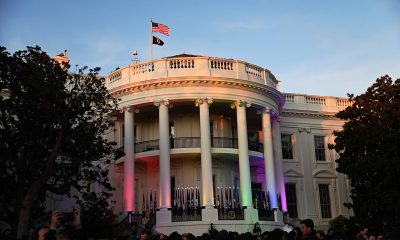Latin America
LGBTQ bars in Latin America: A reporter’s notebook
These spaces are not available to everyone
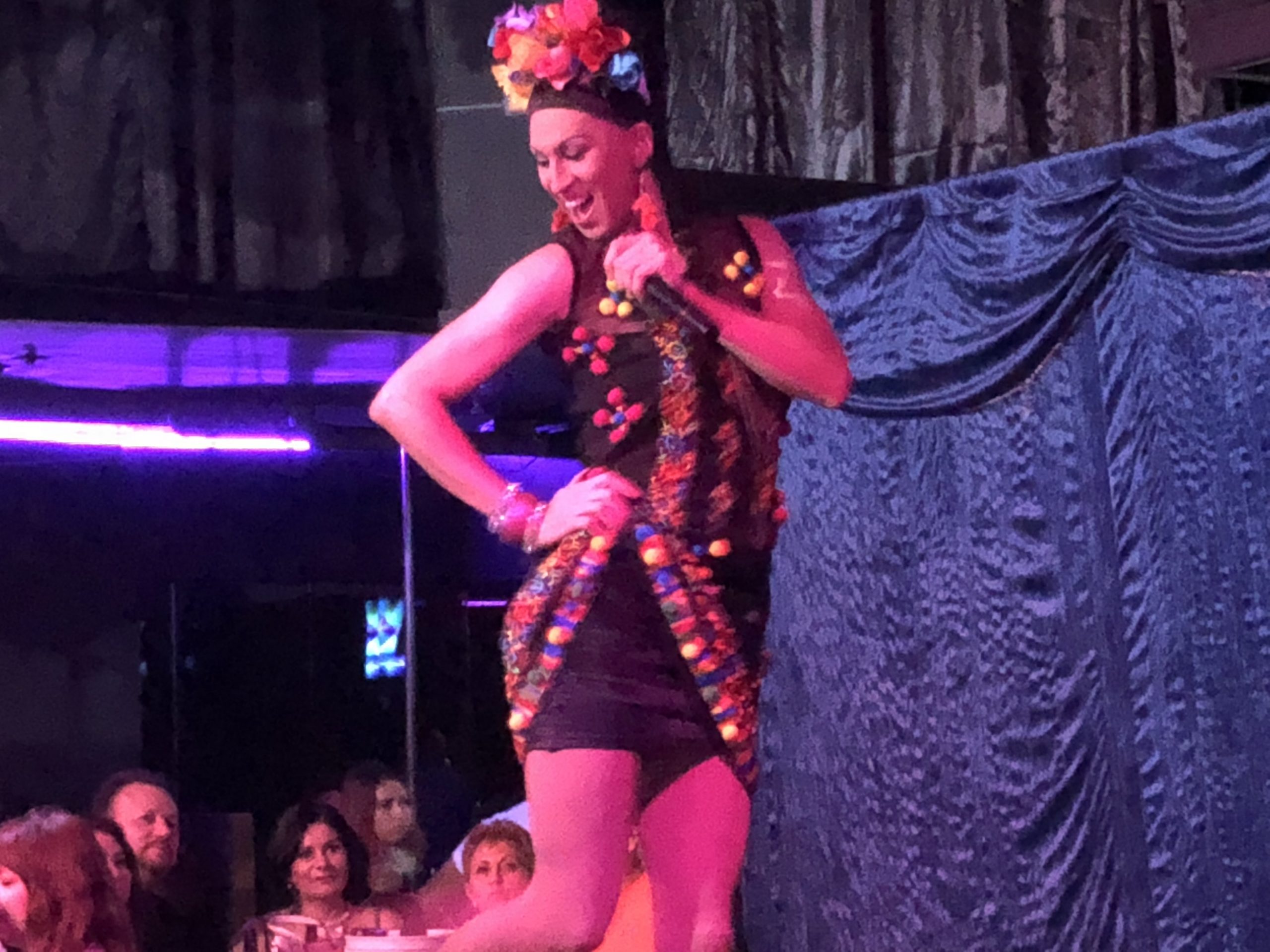
La Purísima is an unapologetically irreverent gay bar on Avenida República de Cuba in downtown Mexico City. One of its most endearing features is the staff who dress as Catholic priests and nuns.
I was on assignment in Mexico City for the Washington Blade, the oldest LGBTQ+ newspaper in the United States for which I am the international news editor, in July when I decided to go to la Purí, as the bar’s known for short. I arrived shortly after 11 a.m. and spent the next 90 minutes or so dancing and slowly sipping shots of mezcal. I was walking outside to get some fresh air when Sergio, a staff person who was dressed as a priest, approached me in the hallway that led to the door and asked me if I wanted to go to confession. I said yes, and he led me to a small booth on the sidewalk. He unlocked the makeshift confessional and we went inside. I had learned in my childhood Confraternity of Christian Doctrine class at St. Thomas Aquinas Church that what one says inside a confessional remains between the penitent, the priest (and God.) I am not one to question Sergio’s standing within the church, but that night at la Purí was quite a memorable one.
I have reported from Mexico, Guatemala, El Salvador, Honduras, Nicaragua, Costa Rica, Panama, Miami, Cuba, the Dominican Republic, Puerto Rico, Colombia, Peru, Chile and Brazil since the Blade hired me in 2012. One of the “traditions” that I have while on assignment in a particular place is to visit a gay bar. Community, regardless of place, is critically important and gay bars are a good way to interact with a certain segment of it that is privileged enough to have access to these spaces.
Some of my favorite places that I have visited while in Latin America are gay bars and clubs. They offer patrons a safe (and fun) place to be themselves, but before I list them I would like to note that not all LGBTQ+ people have access to these safe spaces.
• Bar Lou Lou is a small bar on Rua Teixeira de Melo in the heart of Rio de Janeiro’s Ipanema neighborhood. I was on assignment in Brazil twice in 2022 to cover the country’s presidential election. One night after dinner, I discovered the bar, a couple of blocks from the apartment in which I stayed while I was in Rio in March 2022.
I saw Pride flags and a group of people standing outside on the sidewalk. Walking inside, I ordered a caipirinha and soaked up the lively atmosphere. I returned to the bar a couple of days after. It was my last night in Rio before I flew back to D.C. A Brazilian volleyball player introduced himself to me and invited me to hang out with a group of people from the United States, France and the U.K. whom he had just met. I speak limited Portuguese and his English was limited, but the language barrier did not matter to me and to the group of friends we had just made. We danced and drank caipirinhas for several hours inside the bar and on the sidewalk until closing time at midnight. We exchanged phone numbers and Instagram handles before we hugged each other and said goodbye. I remain in touch with several of them today.
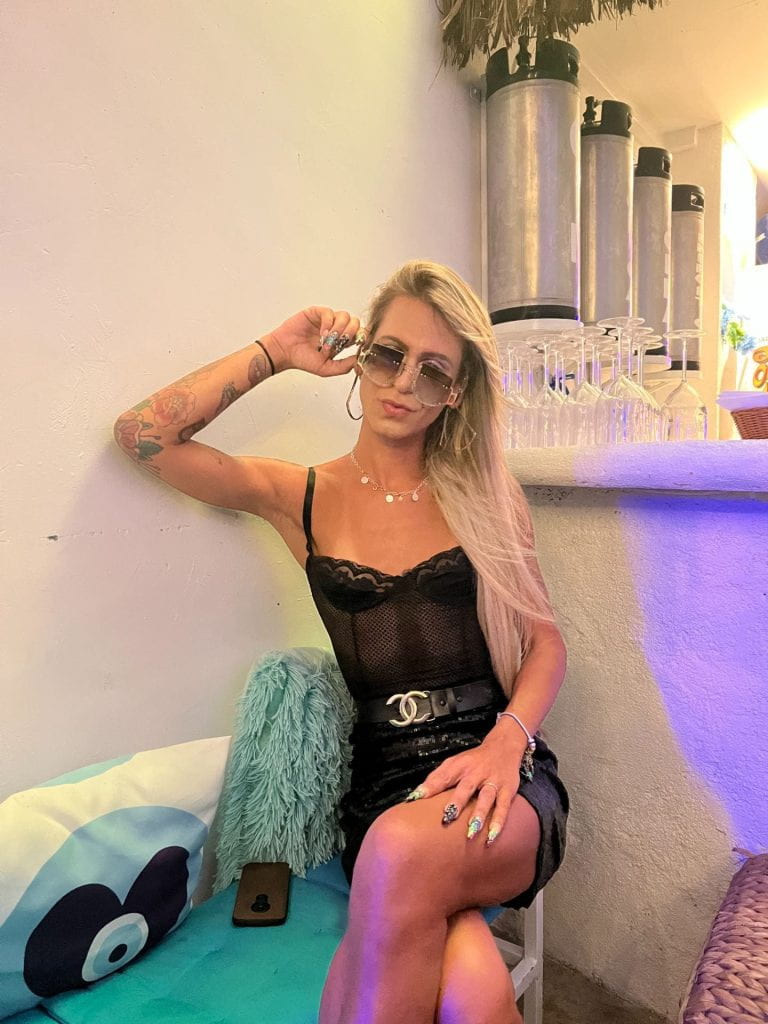
• Indie Lounge is a gay bar in Tegucigalpa, Honduras, that I visited on Feb. 9, 2022, while I was on assignment in the country. Vice President Kamala Harris and U.S. Agency for International Development Administrator Samantha Power had attended Honduran President Xiomara Castro’s inauguration a few weeks earlier. I was driving to an interview with Victor Grajeda, the first openly gay man elected to the Honduran Congress, in San Pedro Sula, two days earlier when I heard on the radio the U.S. Secretary of State Antony Blinken announced sanctions against former Honduran President Juan Orlando Hernández for corruption. (Honduran authorities on Feb. 15, 2022, arrested Hernández at his Tegucigalpa home after the United States requested his extradition on drug trafficking and weapons charges. Hernández’s brother, former Congressman Juan Antonio “Tony” Hernández, is serving a life sentence in the United States after a federal jury convicted him of trafficking tons of cocaine into the country.) On the night I visited, Indie Lounge staff invited patrons to submit messages that would then appear on television screens throughout the bar. One of the messages read, ‘happy divorce, Andrés.” My husband’s name is Andrés, and I began to laugh when I saw it.

• Las Tunas, Cuba, is a provincial capital about 400 miles southeast of Havana. The National Center for Sexual Education (CENESEX), a group directed by Mariela Castro, the daughter of former Cuban President Raúl Castro, organized a series of events in the city in May 2015 to commemorate the International Day Against Homophobia, Biphobia and Transphobia (IDAHOBiT), which honors the World Health Organization’s decision to declassify homosexuality as a mental disorder on May 17, 1990.
The bone-jarring drive from Havana to Las Tunas took more than 10 hours, and I finally arrived in the city shortly before 1 a.m. on May 16. The IDAHOBiT march that Mariela Castro led took place a few hours later. She and two activists later paid homage to Vicente García, a leading figure in the 10 Years’ War from 1868-1878 during which Cubans fought for independence from Spain, during a ceremony that took place in Las Tunas’ main square.
CENESEX also organized a party at a local nightclub on the city’s outskirts. It was around 2:30 a.m. on May 17 when a local bus driver introduced himself to me and asked if I wanted to go to the “after party.” I was exhausted, but I nevertheless accepted the invitation. I had never been to Cuba before, and I took him at his word when he told me that we would take a taxi to the restaurant where the party was taking place. We walked outside and climbed into a horse-drawn cart that brought us, his friends and a drag queen to the party. Our boisterous group made jokes and laughed at each other as the cart made its way through the city. The trip took less than 15 minutes, and the party continued once we arrived at the restaurant. Dawn was breaking when I returned to my hotel. I rested for a couple of hours and then began the long drive back to Havana. (I had reported from Cuba several more times when I arrived at Havana’s José Martí International Airport on May 8, 2019. Cuban customs officials told me that my name was “on a list” and they would not allow me into the country. I spent the next seven hours at the airport before an agent escorted me onto a flight back to Miami. The Cuban government has still not provided me with an official explanation of their decision not to allow me into the country. A contact suggested Mariela Castro, who is a member of the Cuban National Assembly, told the government not to allow me into the country because she did not want me to cover an LGBTQ+ rights march that independent activists organized in Havana three days later. The Cuban government has, to my knowledge, never publicly disclosed why it decided to prevent me from entering the country. I explained what happened to a press attaché at the Cuban Embassy in Washington me in July 2021 after he emailed me about meeting for coffee. He clearly did not know what his government had done to me. I did not hear back from him after I told him what happened.
• Mexicali is a Mexican border city that borders Calexico, Calif., in the Imperial Valley. I was on assignment in the area in July 2018.
The temperature was well over 100°F when I parked my rental car in a parking lot in Calexico at shortly after 8 p.m. on July 21, walked to the border crossing and entered Mexicali. I had a couple of tacos at a small, family-run restaurant and then walked to Taurinos Bar, a gay bar a few blocks south of the border. Patrons were playing pool and drinking beers while I asked the manager about then-U.S. President Donald Trump’s immigration policies and their impact on LGBTQ+ people. I finished the interview and then walked to Porky’s Divine, another gay bar three blocks south of the border. A California woman and members of her bachelorette party were among those who were inside when go go boys took the stage. A drag queen dressed as Frida Kahlo was among those who also performed. The temperate was still around 100°F when I left Porky’s Divine shortly after 1 a.m. on July 22. I stopped at a nearby convenience store to buy a bottle of water and a bag of potato chips before I walked back through the border crossing and into California. I was back at my hotel in El Centro, roughly 12 miles away, in less than half an hour.
Not everyone can access these spaces: They often have cover charges, and that cost, along with drinks and transportation to/from them, are prohibitive to someone who is not economically privileged. And this economic privilege often goes hand-in-hand with violence and discrimination based on factors that include sexual orientation, gender identity and race.
“Access to a car or a job that does not involve sex work could very well mean the difference between life and death for a trans Salvadoran woman or a gay man who is perceived to be too effeminate,” I wrote in the Blade on Feb. 7, 2017, after my first reporting trip to El Salvador. “Many of these people feel as though they have no other option than to leave the country and migrate to the U.S.”
Alexa, a transgender woman with whom I spoke for the Blade in La Ceiba, Honduras, on July 20, 2021, told me it is “very difficult to lead the lifestyle that we lead as trans women” in the country because of discrimination and a lack of employment opportunities because of her gender identity. Alexa spent nearly three years in prison after authorities charged her with attempted murder, even though she claimed she was defending herself against a woman who was hitting her in the face with a rock.
She told me a Salvadoran man raped her in prison. Alexa also said the warden forced her to cut her hair and guards doused her with cold water in an isolation cell after the attack.
“I was a woman,” said Alexa. “They made me a man.”
We were both crying during the interview. We embraced each other for several minutes when it was done.
These stories are incredibly difficult to hear, and they are indicative of the reality for many LGBTQ+ people in the region who struggle to survive on a daily basis. It is crucially important to share these stories. It is also equally as important to show our readers there are safe spaces in Latin America that offer LGBTQ+ people a safe place where they can be themselves. Bars and clubs such venues.
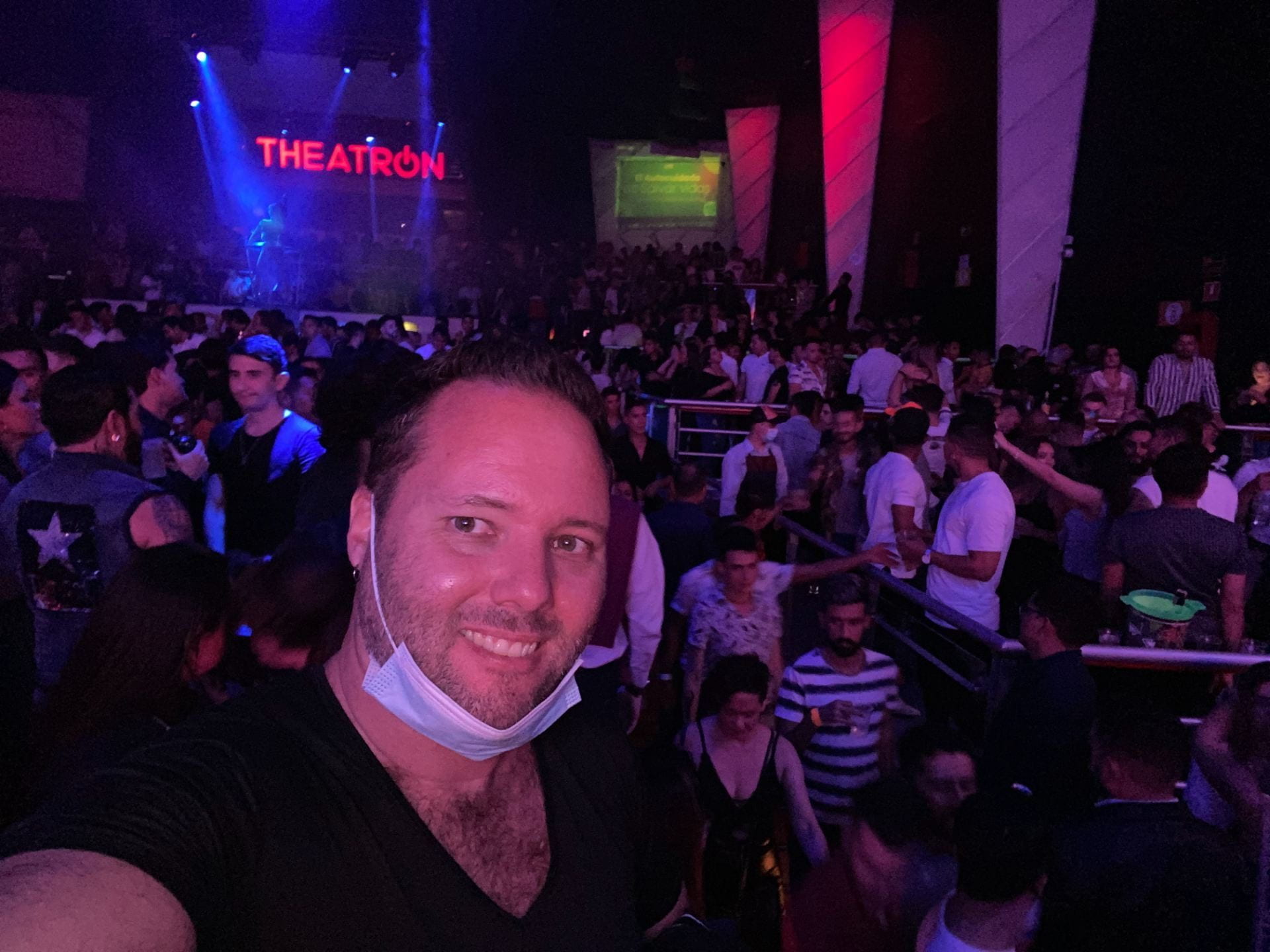
Latin America
LGBTQ cruise ship rescues 11 migrants between Cuba and Mexico
Rescue took place in Yucatán Channel on Wednesday

A cruise ship chartered by an LGBTQ travel company on Wednesday rescued 11 Cubans from a boat that was adrift between their country and Mexico.
Vacaya in a press release said the Royal Caribbean’s Brilliance of the Seas, which had left from New Orleans, discovered the migrants’ boat in the Yucatán Channel, a strait between Mexico and Cuba that connects the Gulf of Mexico (the Trump-Vance administration now refers to the body of water as the Gulf of America) and the Caribbean Sea.
A video that Vacaya provided shows the migrants’ boat before the rescue. Other videos show the rescue taking place.
MTV’s Downtown Julie Brown, who was performing on the ship, described the rescue in a video she posted to social media.
“We are in the middle of a live rescue operation right now,” she said. “The captain of the ship, while we were hauling so fast the other way, thought he saw a boat in distress. So, we looped around … and it was indeed a boat in distress.”
“Nothing speaks more to VACAYA’s values than providing comfort in a moment of need,” said Vacaya CEO Randle Roper in the press release. “I’m so happy we were able to bring these 11 refugees onboard safely and provide medical care, dry clothes, food, and, most importantly, water.”
“It’s sad that some people have to put themselves through such trauma in hopes of finding a better life, but that’s where we are today,” added Roper. “I’m so proud of our LGBT+ guests rallying to collect clothes for these fellow humans in need.”
The ship is scheduled to return to New Orleans on Saturday.
Mexico
Trump executive orders leave LGBTQ migrants, asylum seekers in limbo
Suspension of US foreign aid may force shelters to close

MEXICALI, Mexico — Marlon, a 35-year-old man from Guatemala, used the CBP (U.S. Customs and Border Protection) One app to schedule an appointment that would have allowed him to enter the U.S. at a port of entry.
His CBP One appointment was at 1 p.m. PT (4 p.m. ET) on Jan. 21 in the Mexican city of Tijuana that borders San Diego. Marlon at around 11 a.m. PT (2 p.m. ET) on Jan. 20 learned his appointment had been cancelled.
President Donald Trump took office less than two hours earlier.
“We’re stuck,” Marlon told the Washington Blade on Jan. 31 during an interview at Posada del Migrante, a migrant shelter in the Mexican border city of Mexicali that Centro Comunitario de Bienestar (COBINA), a group that serves LGBTQ people and other vulnerable groups, runs.

The Trump-Vance administration’s immigration policies have left Marlon and many other migrants and asylum seekers — LGBTQ and otherwise — in limbo.
Daniela is a 20-year-old transgender woman from Tijuana who has lived at Jardín de las Mariposas, a shelter for LGBTQ migrants and asylum seekers in the city’s Obrera neighborhood, for a month. Jardín de las Mariposas is roughly six miles south of the Mexico-U.S. border.
She told the Blade on Jan. 29 during an interview that she was raped in Hermosillo, the capital of Mexico’s Sonora state, four months ago. Daniela said her roommate and five other people later tried to kill her when they “were drunk and on drugs.”
Daniela, like Marlon, had a CBP One appointment, but it was cancelled once Trump took office.
“I am completely alone both in Tijuana and elsewhere,” said Daniela. “I think the United States is a better option to be able to start over.”
Stephanie, a 25-year-old from El Paraíso, Honduras who identifies as a lesbian, arrived in Tijuana last July and lives at Jardín de las Mariposas.
She told the Blade her family is “very religious,” and she is the “only one in my family who is a member of the (LGBTQ) community.” Stephanie said a cousin in Louisiana agreed to allow her to live with her once she entered in the U.S., but she refused once she saw she had cut her hair.
“I felt a bit of freedom once I arrived here in Mexico … and I decided to cut my hair because it was very long,” recalled Stephanie. “One day she did a video call and she saw my short hair and she was like I cannot receive you; I cannot receive you because what example are you going to be to my son.”
Trump, in addition to shutting down the CBP One app on Jan. 20, issued several immigration-specific executive orders after his inauguration. They include:
• Declaring a national emergency on the Southern border
• Suspending the U.S. Refugee Admissions Program
• Ending birthright citizenship under the 14th amendment. (U.S. District Judge John Coughenour, who Ronald Reagan appointed, in a Jan. 23 ruling that temporarily blocked the directive described it as “blatantly unconstitutional.”)
Trump has reinstated the Migrant Protection Protocols program, also known as the “Remain in Mexico” policy that forced asylum seekers to pursue their cases in Mexico.
State Department spokesperson Tammy Bruce on Tuesday said Salvadoran President Nayib Bukele during his meeting with Secretary of State Marco Rubio “agreed to take back all Salvadoran MS-13 gang members who are in the United States unlawfully,” and “promised to accept and incarcerate violent illegal immigrants, including members of the Venezuelan Tren de Aragua gang, but also criminal illegal migrants from any country.” The Department of Homeland Security in a press release notes Tren de Aragua members were on the first U.S. military “flight of criminal aliens” that arrived at the Guantanamo Bay Naval Base in Cuba on Tuesday.
Jardín de Las Mariposas Director Jamie Marín on Jan. 29 told the Blade that Trump’s policies have sparked “a lot of fear.”
She said some of the shelter’s residents who had their CBP One appointments cancelled have either returned to their countries of origin or have found another way to enter the U.S., including with the help of smugglers who are known as “coyotes” in Mexican Spanish. Marín said Jardín de las Mariposas is working with those who have decided to stay in Tijuana to help them secure identity documents and employment.
“Our goal was to be a temporary shelter to move to the United States,” she told the Blade. “Now it’s almost becoming like we’re going to become a permanent shelter until we find another solution for them.”

Susy Barrales is president of Casita de Unión Trans, a trans support group that she founded in Tijuana in 2019 after she was deported from the U.S.
She told the Blade during a Jan. 30 interview at her office, which is a few blocks from the border, that two migrants who the U.S. deported arrived at Casa de Unión Trans the day before without medications. Barrales, like Marín, said the Trump’s immigration policies have sparked concern in Tijuana.
“He is doing this political campaign,” said Barrales in response to the Blade’s question about Trump’s policies. “I think it is something political, a political strategy that he wants to do, as a way to slow down immigration. This is why he makes these types of racist comments against migrants and against the community.”
Situation along Mexico-US border is ‘tense’
The Trump-Vance administration’s decision to suspend nearly all U.S. foreign aid spending for at least 90 days has had a direct impact on Mexican organizations that serve LGBTQ migrants and asylum seekers.
Casa Frida works with upwards of 300 LGBTQ asylum seekers and migrants in Mexico City and in the cities of Monterrey and Tapachula. Sixty percent of Casa Frida’s annual budget comes from U.S. government grants — specifically from the U.S. Agency for International Development, the State Department, and its Office to Monitor and Combat Trafficking in Persons.
Casa Frida Director Raúl Caporal on Monday told the Blade the U.S. on Jan. 24 suspended funding for five of his organization’s initiatives.
A poster inside COBINA’s offices on Jan. 31 contained a QR code that brought migrants to a WhatsApp page that had information about how they could “migrate informed and legally.” The State Department partnered with Partners of the Americas, a Washington-based NGO, on the initiative.
Maky Pollorena, a Mexicali-based activist who volunteers with COBINA, told the Blade the WhatsApp page stopped providing information on Jan. 24. Pollorena also said COBINA and the majority of migrant shelters in Mexico’s Baja California state of which Mexicali is the capital have lost between 50 and 70 percent of their funding.
“All of us who are in Baja California’s border strip are tense,” said COBINA President Altagracia Tamayo.

Marín noted Jardín de las Mariposas’ funding does not come from the U.S. government, but rather from the Transgender Law Center and other NGOs that include AIDS Healthcare Foundation. Baja California Gov. Marina del Pilar Ávila’s administration donated the building in which Jardín de las Mariposas is located. The International Organization for Migration, the U.N. High Commissioner for Refugees, and the Organization for Refuge, Asylum and Migration are also support Jardín de las Mariposas.
Despite this lack of dependence upon U.S. government funding, Marín said the Trump-Vance administration’s policies could prove deadly.
“These decisions from the Trump administration are going to cost a lot of lives for the LGBT community, not only here,” she said. “It’s also going to cost a lot of lives in the United States.”
Mexico
Mexican group that serves LGBTQ migrants may close without US funding
60 percent of Casa Frida’s annual budget comes from Washington

Editor’s note: International News Editor Michael K. Lavers is on assignment in Mexico to cover the impact that President Donald Trump’s immigration policies are having on LGBTQ migrants and asylum seekers.
MEXICO CITY — The Trump-Vance administration’s decision to freeze nearly all U.S. foreign aid spending for at least 90 days could force a Mexican organization that serves LGBTQ migrants and asylum seekers to close.
Casa Frida works with upwards of 300 LGBTQ asylum seekers and migrants in Mexico City and in the cities of Monterrey and Tapachula.
Casa Frida Director Raúl Caporal on Monday told the Washington Blade during an interview at his Mexico City office that 60 percent of his organization’s annual budget comes from U.S. government grants — specifically from the U.S. Agency for International Development, the State Department, and its Office to Monitor and Combat Trafficking in Persons.
Caporal said the U.S. on Jan. 24 suspended funding for five Casa Frida initiatives that specifically focused on “organizational strengthening, humanitarian assistance, financial inclusion, digital security” and fighting human trafficking.
Secretary of State Marco Rubio on the same day directed State Department personnel to stop nearly all U.S. foreign aid spending for 90 days in response to an executive order that Trump signed on Jan. 20. Rubio last week issued a waiver that allows the President’s Emergency Plan for AIDS Relief and other “life-saving humanitarian assistance” programs to continue to operate during the funding freeze.
“All of these (Casa Frida) services are now extremely limited and compromised because the suspension was immediate,” Caporal told the Blade.
He said Casa Frida has already laid off several staffers. Caporal also told the Blade the U.S. funds that remain in Casa Frida’s bank account may have to be returned to Washington.
“That implies many problems,” said Caporal. “It’s not only the continuity of our services, but it also puts the organization’s future at risk.”
Casa Frida has already laid off several staffers. Caporal told the Blade that he and his colleagues are working with the European Union, foreign governments, local officials, and private donors to find additional funding sources.

The waiver that Rubio issued notes it does not apply to “activities that involve abortions, family planning conferences” and “gender or DEI ideology programs, transgender surgeries, or other non-life saving assistance.”
Caporal said there is a chance the White House could extend the funding freeze in order to “review which international cooperation projects align or coincide with the current administration’s political interests.”
“We are quite certain that much of this aid is going to return,” he said. “But (Trump) since the campaign has made it very clear that nothing, not a single dollar for the LGBT community, or for sexual rights, reproductive rights, women, migrants.”
“It is therefore very possible that projects that have more to do with eliminating inequality gaps, poverty, urban development, etc., will return,” added Caporal. “But we are not waiting for these projects to be reactivated.”
Casa Frida is among the global LGBTQ organizations dependent upon U.S. support that have been left scrambling. The Blade is in touch with several of them that may have to curtail programming or even close if they cannot secure alternate funding sources.
The Blade will update this story.
-

 Opinions5 days ago
Opinions5 days agoIt’s time for new leadership on the Maryland LGBTQIA+ Commission
-

 The White House4 days ago
The White House4 days agoWhite House does not ‘respond’ to reporters’ requests with pronouns included
-

 Arts & Entertainment5 days ago
Arts & Entertainment5 days ago‘Gay is Good’ Pride Pils Can Celebrates Frank Kameny’s 100th Birthday for WorldPride in D.C.
-

 Sponsored5 days ago
Sponsored5 days agoTHC Drinks: What You Should Know About Cannabis Beverages

